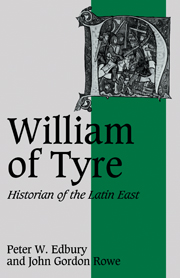Book contents
- Frontmatter
- Contents
- Preface
- Abbreviations and forms of reference
- Introduction
- PART I WILLIAM OF TYRE AND THE WRITING OF THE ‘HISTORIA’
- PART II WILLIAM OF TYRE AND THE MEANING OF THE ‘HISTORIA’
- 5 The monarchy
- 6 Regnum and ecclesia
- 7 The papacy
- 8 The Byzantine empire
- 9 The war against the infidel
- Conclusion
- Bibliography
- Index
- Cambridge studies in medieval life and thought
8 - The Byzantine empire
Published online by Cambridge University Press: 09 October 2009
- Frontmatter
- Contents
- Preface
- Abbreviations and forms of reference
- Introduction
- PART I WILLIAM OF TYRE AND THE WRITING OF THE ‘HISTORIA’
- PART II WILLIAM OF TYRE AND THE MEANING OF THE ‘HISTORIA’
- 5 The monarchy
- 6 Regnum and ecclesia
- 7 The papacy
- 8 The Byzantine empire
- 9 The war against the infidel
- Conclusion
- Bibliography
- Index
- Cambridge studies in medieval life and thought
Summary
The relationship of the crusaders and their successors in Latin Syria with the Greeks of the Byzantine empire is a subject which deservedly has occupied the attention of historians. Without doubt the crusading movement made a major contribution to the growing estrangement between the Catholic West and the Orthodox East in the course of the twelfth century. At the time of the First Crusade the Greeks and the westerners had each benefited from the other's assistance, but soon mutual incomprehension and conflicting political ambitions in the East gave rise to disputes and bitter recrimination. However, relations were not uniformly sour throughout the period, and many contemporaries continued to envisage cooperation. In the twelfth century, as in later periods, Byzantium and its rulers had both detractors and apologists, and William of Tyre was among those who had much to say in this connection.
A considerable amount of material dealing with Byzantine affairs is included in the Historia, and it is important to understand William's attitudes towards the Greeks in order to evaluate his perception of their relations with the Latins. He was well placed to provide an appraisal of the empire and its emperors. Twice, in 1168 and in 1179–80, he had been engaged in diplomatic activities in Byzantium, and he had also had dealings with the Byzantine envoys to Jerusalem in 1177.
- Type
- Chapter
- Information
- William of TyreHistorian of the Latin East, pp. 130 - 150Publisher: Cambridge University PressPrint publication year: 1988



